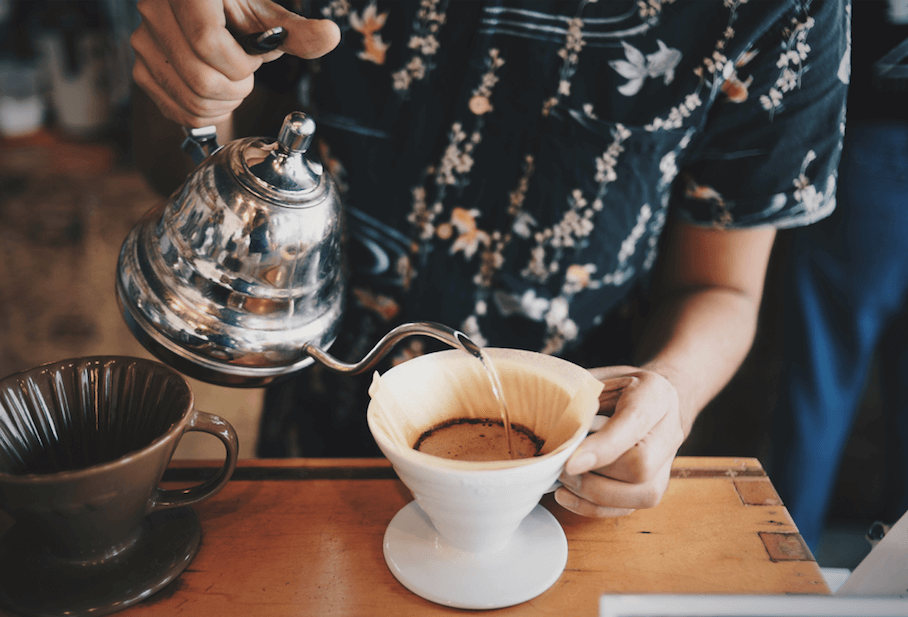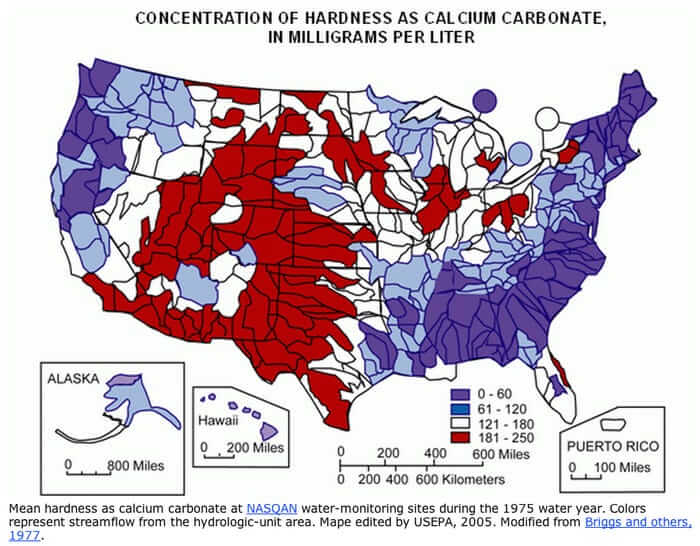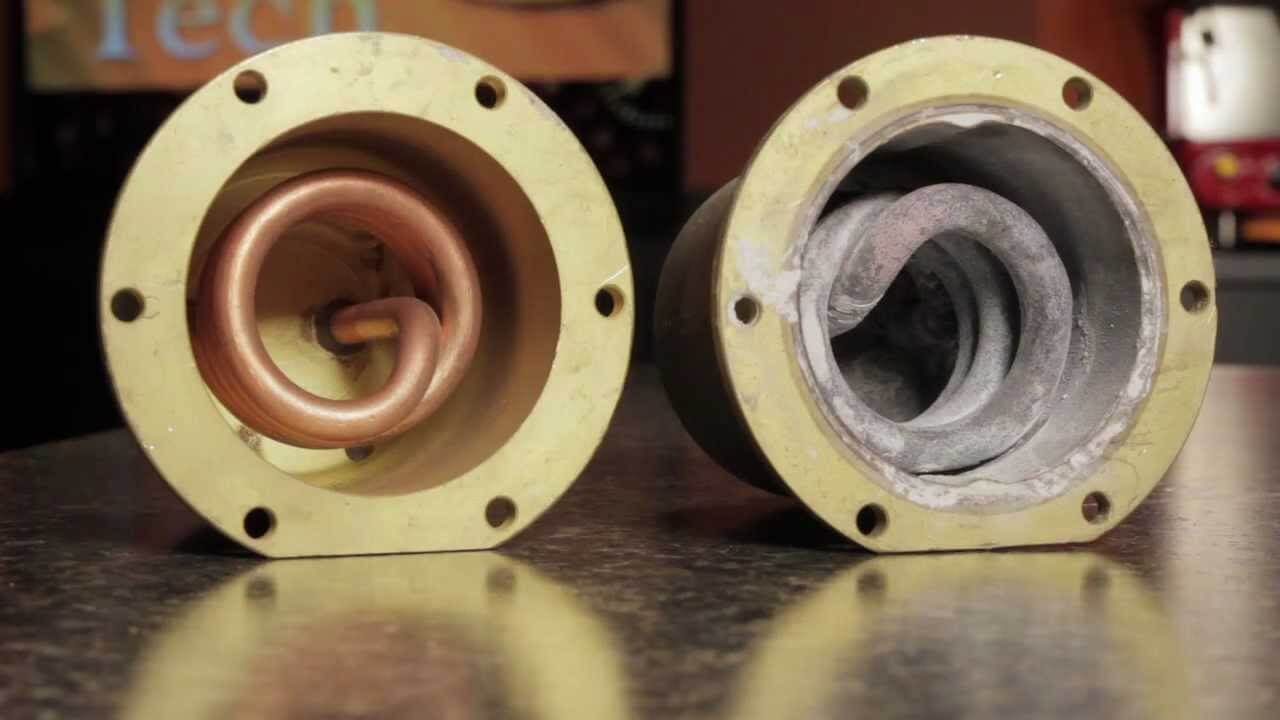A cup of coffee is actually 98 percent water, so always make sure you only use the high-quality water to brew the best possible coffee every time.
A perfect cup of coffee is a game of balance.
It requires well-roasted beans, the right grind, a carefully designed brewer, and proper techniques to achieve a best tasting cup’o joe.
But when you notice, the coffee you brew turns out to be flat, consistently bitter, or otherwise just not the right you thought to have. At first, you might think there’s something wrong with coffee beans or the brewing process.
BUT an overlooked element that constitutes perhaps 98% weight of a delicious cup of coffee: Water.

It actually matters significantly, and ignoring this one element will likely leave an unpleasant taste in your mouth.
Here is how it affects the quality of your coffee.
How Does Water Quality Affect the Taste of Coffee?
The quality of water varies throughout regions of the world but filtered, and tap water is the type that coffee enthusiasts commonly use to brew coffee, mainly because it is easily available everywhere.
Many of you might be thinking, “does it really matter if water is filtered?” after all, it gets fairly boiled during the brewing process, so even if it’s not good quality water, it really doesn’t matter.
Absolutely wrong!
Choosing the right quality of water matters a lot!
Conventional wisdom will tell you, filtered water can be your best bet, but you may surprise to know that minerals found in tap water can truly enhance the flavor of your coffee, says Christopher H. Hendon.
Understanding Hard and Soft Water Areas
As I’ve already stated, the quality of tap water is pretty much dependent on where you live, it could contain a different mix of minerals, such as magnesium and sodium, that will further determine whether water is hard (higher in minerals) or soft (most distilled water).
Here’s the map of the United States that shows the difference in water hardness from place to place, although it can also vary over time.

When Hendon teamed with the winners of Barista UK Championship in April, they could figure out (with an experiment running on the computer) that different kinds of water “hardness” can affect the taste of your cup of coffee.
So, why does water matter?
Roasted beans are packed with compounds like citric acid, lactic acid, and eugenol. These compounds exist in different variations, giving them complex and varying flavors.
Water is complex itself, which means, when you get tap water, you get not only H₂O but also the different levels of magnesium and calcium, which have unique properties, thus affect the taste of your coffee.
Some of the compounds in the hard water are “sticky,” glomming onto certain compounds in coffee when they mix (usually in your coffee maker).
For example, if eugenol hangs on to, your coffee will taste “woodsier.” Similarly, magnesium is a sticker compound that makes you a stronger cup of java (mainly a high jolt of caffeine).
On the flip side, if water has a high level of bicarbonate, it will possibly make you a bitter cup of coffee, reported Hendon.
While hard water can be good or bad, it all depends on its chemical make up and how it will interact with your coffee beans, but soft water has no benefit at all. It contains sodium and has no flavor stickiness, so results in a “poor extraction of power,” found Hendon.
Quick Note: If you use the same roasted beans with “high-magnesium” hard water, it can make you more flavor and a stronger cup of coffee as compared to distilled or softened water.
Unless you’re a serious coffee freak, you probably won’t dive deeper into the nitty-gritty of figuring out both your water composition and chemical make-up of your coffee beans to ensure the perfectly delicious cup of java.
But you don’t have to, there’s good news. You can start by looking up into the water type in your area and choosing the beans that match best for hard or soft water.
However, to make it even easier, you should seek out local coffee roasters because they use to test the coffee beans with your local area’s tap water and have thus been optimized for chemical make up of local water’s to ensure the best possible cup of coffee.
Alternatively, if you want to adjust the water for your coffee beans, there are also different tests available in the market, both for your household and professional use.
Methods to Optimize Water for Your Coffee
Based on the various analysis and test results, you should be able to select the best possible method(s) for adjusting the water setup.
In particular, at a cafe or restaurant, it might be a good idea to install a water filtration system if water is higher in carbonate concentration. However, at home, you can use some kind of equipment from a filter sets to purify your water.
Household and Professional Usage (Both)
- Pre-Filtration Method is used to remove dirt particles, debris, and organic matter from harvested water.
- Activated Carbon (Charcoal) Filtration involves using the bed of activated carbons to tie up impurities, color, odor, and cloudiness from water. However, it doesn’t affect the water minerals’ content.
- Fine Filtration is done after performing other treatments just to remove any particular matter such as metals or chemicals to make the water taste and smell better.
Mainly in Professional Usage
- Demineralization and Remineralization is the process done by an ion exchanger or mineral introduction during the filtration to restore the strength and pureness of water.
- Reverse Osmosis (RO) is the process of removing dirt and impurities from the water by using the pressure to force water through a semipermeable membrane. This process helps in filtering and flushing away the dirt and leaves drinkable clean water.
- Ultraviolet (UV) Water Purifying System penetrates harmful pathogens from the water and kills the illness-causing microorganisms by attacking their DNS. Usually, this process is used in conjunction with other filtration methods such as reverse osmosis and carbon block filters.
Quick Note: Keep in mind the UV water purification system is just to remove the harmful microbes from your water. It’s never meant or shouldn’t be used to manipulate mineral content and definitely not to make drinkable water from contaminated water.
How Does it Affect My Coffee Machine?
This is another reason, the quality of water matters a lot!
When hard water (with more than the average level of minerals) is heated inside your coffee machine, it builds up calcium salt crystals and forms a layer of scale.
This formation:
- Slows down water flow and operation in pipes.
- Damages the internal parts, including boiler and heating element, which may result in loss of pressure and temperature.
- Leads to the pressure gauge read incorrectly.
- Reduces the efficiency and lifespan of machines.
- Causes your coffee to taste strange lately, and water pours down from your machine being non-transparent and even flaky.
Not only it affects your machine, but it can also affect you negatively. In fact, researchers found that limescale formation has proven to be unhygienic and dangerous for some people.

Use high-quality water as we discussed above, try descaling your machine after a specific time duration (week/monthly, also depends on the usage), and clean it with filtered water.
But if you’re using a commercially oriented machine, I’d recommend NOT to descale it yourself and get the services from a certified technician who will descale the machine for you.
But if you suspect the scale build-up, do the following:
- Check the water hardness level in your area, a Water Hardness Strip is good enough to tell you how harmful it’s for your coffee machine and for your health.
- If your coffee machine is equipped with Thermoblock heating system, you can use a de-scaler to descale it right away at your home after an average of 3 or 6 months.
- Use the right kind of water softening solution for your machine.
While keeping your machine scale-free can be fairly convenient and affordable, it will not only play a role in preventing the bad-tasting coffee but also takes care of your investment by improving the life expectancy of your coffee maker.
Tips for a Balanced Cup of Coffee with Water
Just as you know the quality of water matters a lot, here are a few tips to nail down in order to ensure a perfect cup of coffee.
1. Coffee-to-Water Ratio
A general guideline that’s well-known as “Golden Ratio” – general rule is one to two tablespoons of coffee for every six ounces of water, says, National Coffee Association (NCA). However, you can adjust it even further to match your taste.
2. Water Temperature
Water temperature is a crucial factor and plays a vital role because it draws the flavor from coffee grounds.
If water temperature is too hot, it will risk an over-extraction and make you a bitter-tasting coffee. And if water is too cold, it will make you a weaker cup of coffee because of under-extraction – that will be more of tainted water with a coffee hint.
So, what should be the ideal temperature?
According to the National Coffee Association, 195°F to 205°F is the perfect temperature range for optimal extraction.
If you’re brewing coffee manually, let the coffee boil fully but avoid overboiling. Turn off the heat source and let it rest for a minute before pouring over your coffee grounds.
3. Brewing Time
Besides other crucial factors, the contact time of water with coffee grounds is another important factor. It varies, depending on the type of brewing method you’re using.
For instance, if you’re using a drip coffee machine, the contact time shouldn’t be more than 5 minutes, for French Press, it should be between 2-4 minutes.
Espresso has the shortest brewing duration – around 20-30 seconds. Contrarily, for Cold Brew, coffee should be in contact with water for overnight (around 12 hours).
But, if you’re not happy with the brewed coffee, chances are, you’re:
- Over-extracting – Brewing time is very long.
- Under-extraction – Brewing time is too short.
Of course, there’s a learning curve, so keep on experimenting with the contact time until you hit the right balance that satisfies your taste buds.
Pro Tip: Brewed coffee begins to lose its taste right after brewing, so make as much coffee as you want to drink. Otherwise, you’d have to use an insulated thermos to keep it warm for hours.
A Few Final Words
So, is this all the trouble worth-able?
It definitely pays off, and even if it manipulates your water a bit, you’ll still be able to achieve a well-balanced cup of java.
Remember, there are no values for those minerals and other contents, it’s just all about balance and interaction between water and roasted coffee beans.
So, what’s next?
Go ahead, put your nerd glasses on, have fun and keep on experimenting until you make tastebuds’ satisfying cup of coffee.
You may also be interested in:
I didn’t know that some hard water is dangerous to your coffee. I guess that makes sense considering you will be ingesting too many minerals. I’ll have to consider getting a coffee bag that fits well with any temperature.
Oh, I hope tips will address my coffee issues. I hav high calcium water. Many thanks